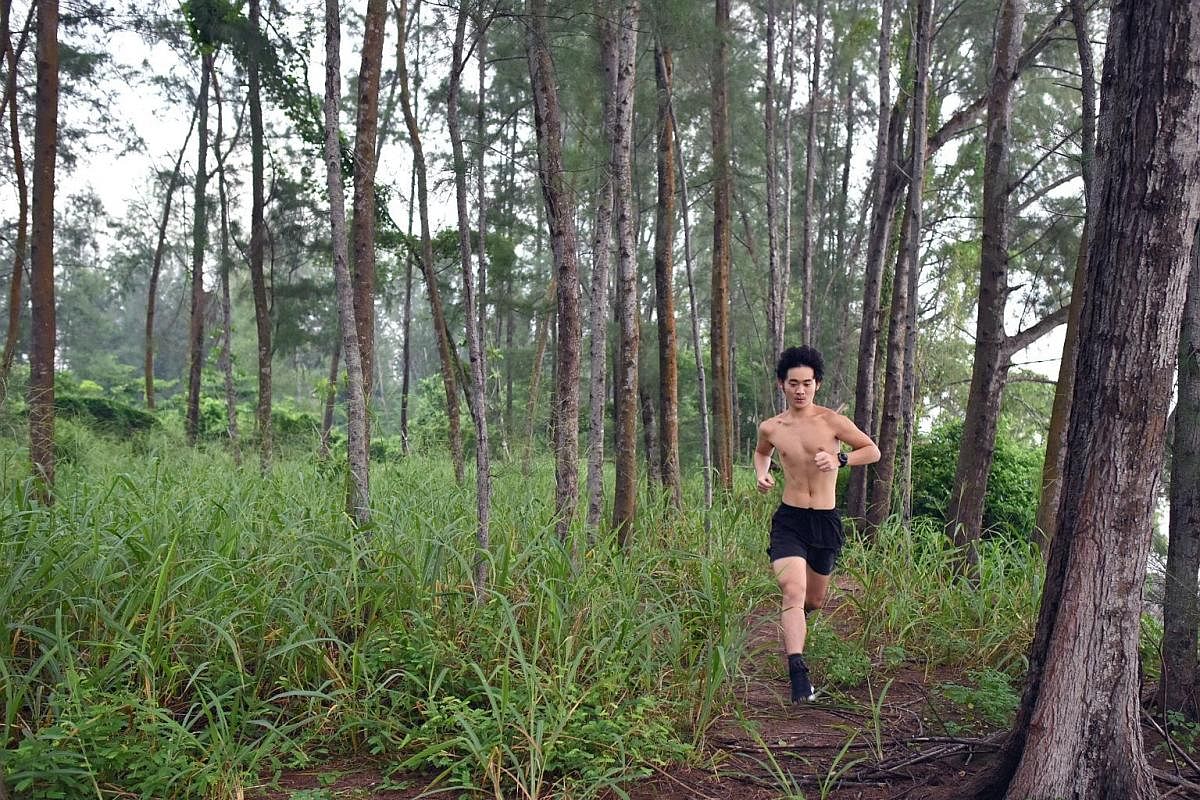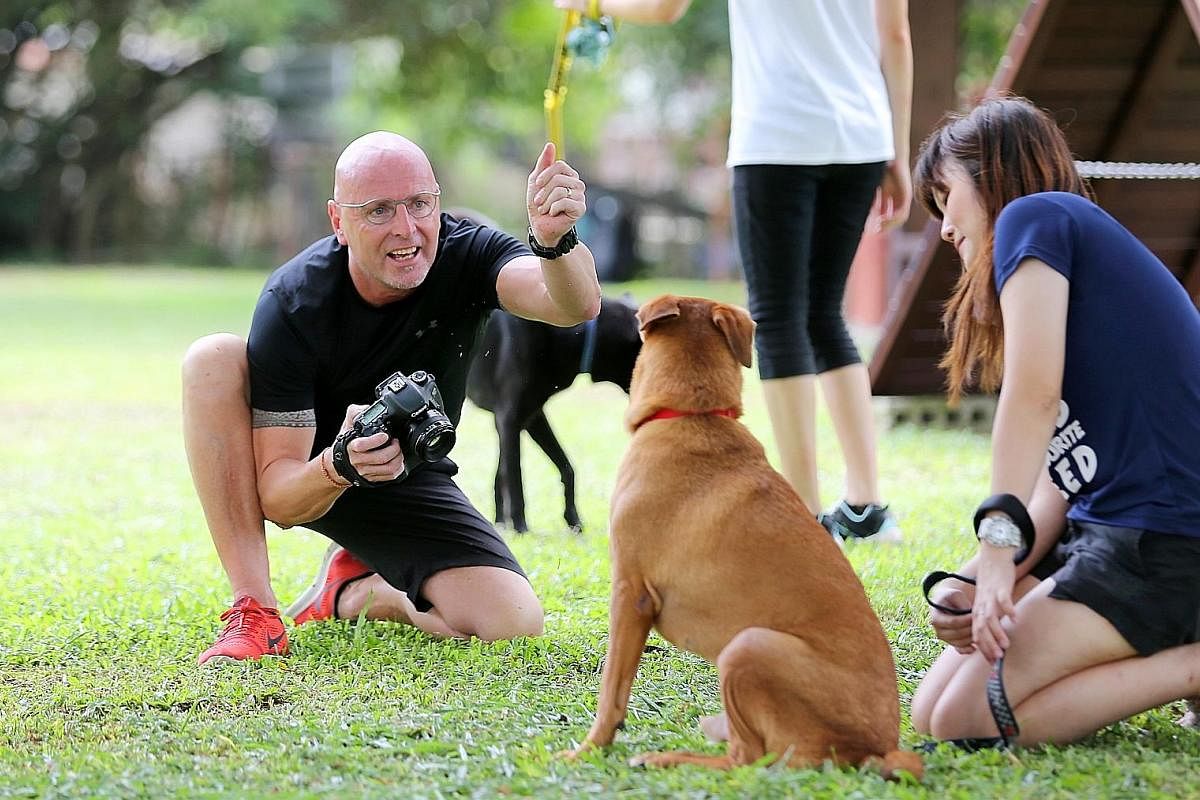Animal welfare and conservation
Chipping in with time and skills
More volunteers are helping animals and the environment by offering services pro bono


In Fujian, China, where he is working as a management trainee in a ceramics company, Singaporean Kyle Lek Kai Ming runs 10km every day.
This is not only for fitness, but also for charity. The 25-year-old Singaporean has a personal fundraising campaign called Run Wild It Lasts, in which he has pledged to run 10km every day for a year, aiming to complete 3,650km by the end of the campaign.
For every kilometre he runs, he will donate a dollar to the World Wide Fund For Nature (WWF) Singapore.
Through his campaign, he hopes to educate people on environmental protection. The project, which "links (his) fitness training and passion for nature conservation", started in April last year. Since then, he has run 3,670km, as tracked on his sports watch. Even though he has reached his goal, he intends to continue until the end of the month to complete the year.
Some days, he admits it is tough to keep up with the required distance. But he says: "If I quit, people won't feel the sincerity of my campaign and what I'm running for."
Nowadays, animal lovers are finding new and creative ways of philanthropy beyond writing a cheque.
Apart from interacting with animals or nature - such as helping out at an animal shelter - or giving money to causes, these do-gooders support animal welfare and conservation causes by offering specialist skills pro bono. The aim is to spread the message of their cause more effectively and to a wider audience.
People volunteer services such as photography, video-editing and even legal advice.
New Zealander Glenn Elvy, 52, has taken photos of dogs for free for Causes For Animals Singapore's (CAS) website and Facebook page for the past two years. The organisation aims to save the lives of homeless and unwanted dogs and cats in Singapore through rehabilitation.
The photos are meant to boost adoption rates of the animals, which are usually found abandoned on the streets.
For each photography session, the freelance graphic designer and photographer takes along a roller bag filled with photography equipment that he sets up at the animal shelter in Seletar.
He sometimes carries a notebook filled with sketches of poses for reference. He then gets the dogs into those poses to make them as attractive as possible to potential adoptive parents.
He says: "Photos make a difference. I would try to capture the traits of the dogs. We want to show that mongrels can be friendly and good dogs to take care of."
Each photo session can take up to an hour and Mr Elvy also spends time editing the photos afterwards.
Also volunteering his time is self-taught video editor Yeo Eng Heng, 21, who has stayed up past midnight every other night to edit videos for WWF Singapore for the past three months.
"I spend so much time on it because I don't want to let them down," says the intern at a catering company. "I want to take concrete action. With me, they do not have to hire an in-house video editor and the money they save can be used elsewhere."
He splices footage WWF Singapore has given him to work with and coordinates visuals and music to promote the key messages of events such as Earth Hour.
Other eco-minded volunteers offer their time by spreading a wider message about the importance of wildlife conservation.
Take full-time national serviceman Tay Yong Hong, 19, who has been volunteering as a conservation ambassador at Wildlife Reserves Singapore since he was 14.
Stationing himself at various sections of the River Safari, he approaches visitors to start informative chats on animal facts and stories, while stressing the significance of wildlife conservation.
Organisations such as the Society for the Prevention of Cruelty to Animals (SPCA) and CAS say that while there is greater awareness of the various roles people can undertake as volunteers, the groups still need more manpower.
"Volunteers who help with administrative tasks allow us to channel more of our funds directly to animal welfare projects," SPCA executive director Jaipal Singh Gill says.
This is not to say that monetary donations are any less significant - without funds, welfare and conservation organisations are unable to run.
Working in international tax services by day, Ms Tan Lixin, 24, who volunteers with Animal Lovers League by helping out with dog rehabilitation, marketing and sponsorship, says that cash is always useful. The organisation cares for vagrant cats and dogs as well as abandoned and rescued animals.
She says: "Donations can pay for rent, for medical attention for animals and for the spaying and neutering of newly rescued street animals, helping the animals to be as adoptable as possible."

Inspired to help after bird's rescue
"They rushed over to the university in a van with four to five people right after we made the call, all for a tiny baby bird."
Asked why she decided to volunteer at Acres (Animal Concerns Research and Education Society), Ms Roodra Veera, 24, recounts this dramatic rescue with a tinge of awe in her voice.
During her university days, a baby starling had fallen out of its nest and she recalls how her friend had phoned Acres for help.
"I saw their dedication and I knew I wanted to work with these people."
So she joined the organisation.
Founded in 2001, Acres focuses on the protection of all animals. The charity has various key areas, such as targeting the illegal wildlife trade and wildlife rescue and rehabilitation.
Ms Veera, a research assistant at the National Institute of Education, does not take part in the emergency rescue efforts, which first impressed her about the organisation.
Instead, she helps out in less glamorous ways, such as coordinating fund-raising events and helping with sales during roadshows.
On her behind-the-scenes work, she says: "People are surprised when they hear about how I contribute. When it comes to volunteering at animal welfare organisations, many would associate volunteering with the animals themselves.
"I recognise that there needs to be help in other areas, and spreading the word is important too when it comes to helping animals."
Join ST's Telegram channel and get the latest breaking news delivered to you.
A version of this article appeared in the print edition of The Sunday Times on April 02, 2017, with the headline Chipping in with time and skills . Subscribe
